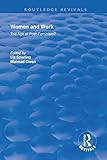Women and Work : The Age of Post-Feminism
By: Sperling, Liz | Owen, Mairead.
Series: Routledge Revivals. Publisher: New York Routledge Taylor & Francis Group New York and London 2018Description: xii,203p.ISBN: 9781138734432.Subject(s): Women--Employment -- Women--Economic conditions -- feminismDDC classification: 331.4 Summary: This title was first published in 2000: The 1990s have been heralded as the 'age of women' based on the facts that, globally, more women are benefiting from formal education and are in paid employment in greater numbers than ever. As such, the possibility that an age of post-feminism has been reached, in which battles for women’s basic rights have largely been won, is implied. This book, based on research across academic disciplines, challenges such claims. Using women and work as the basis analysis, the authors consider whether such things as flexible working, equal opportunities initiatives and even contemporary conceptions of citizenship are universally beneficial to women. The book presents research ranging from issues of immigrant sex-workers in Japan to the implementation of EU equality policies and raises the ironic question that, as the global economy increasingly depends on women, could a growing but uneasy alliance be developing between capitalism and feminism?| Item type | Current location | Call number | Status | Date due | Barcode |
|---|---|---|---|---|---|
 Books
Books
|
NASSDOC Library | 331.4 WOM- (Browse shelf) | Available | 51418 |
Include Bibliography & Index
This title was first published in 2000: The 1990s have been heralded as the 'age of women' based on the facts that, globally, more women are benefiting from formal education and are in paid employment in greater numbers than ever. As such, the possibility that an age of post-feminism has been reached, in which battles for women’s basic rights have largely been won, is implied. This book, based on research across academic disciplines, challenges such claims. Using women and work as the basis analysis, the authors consider whether such things as flexible working, equal opportunities initiatives and even contemporary conceptions of citizenship are universally beneficial to women. The book presents research ranging from issues of immigrant sex-workers in Japan to the implementation of EU equality policies and raises the ironic question that, as the global economy increasingly depends on women, could a growing but uneasy alliance be developing between capitalism and feminism?


There are no comments for this item.